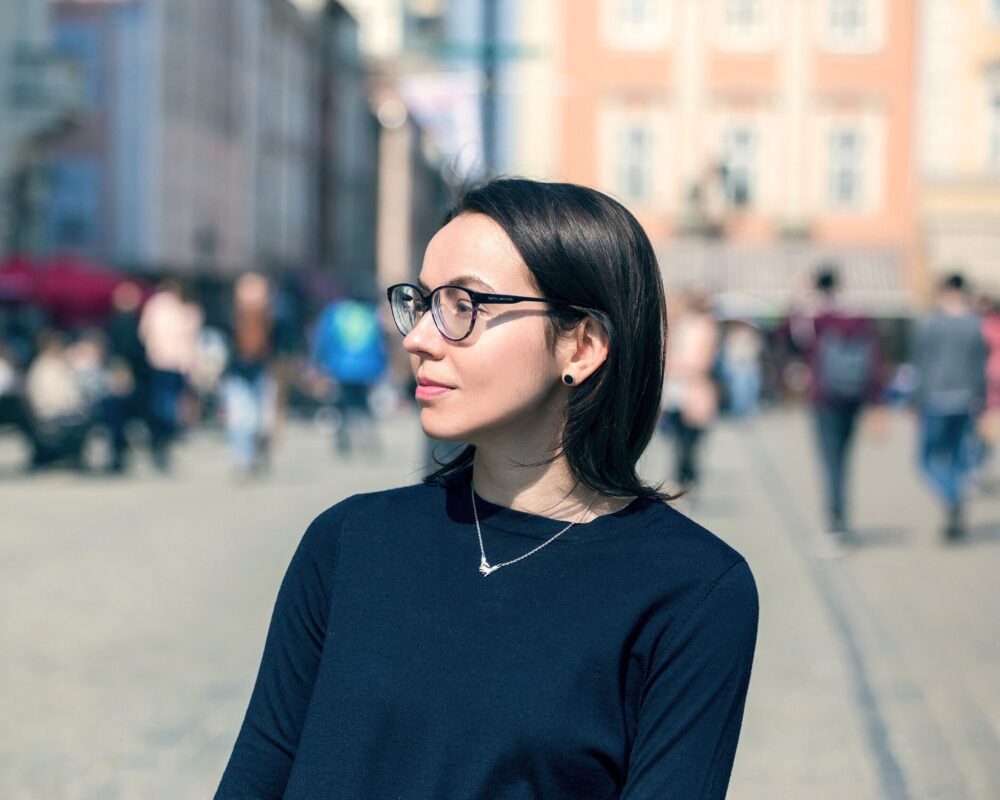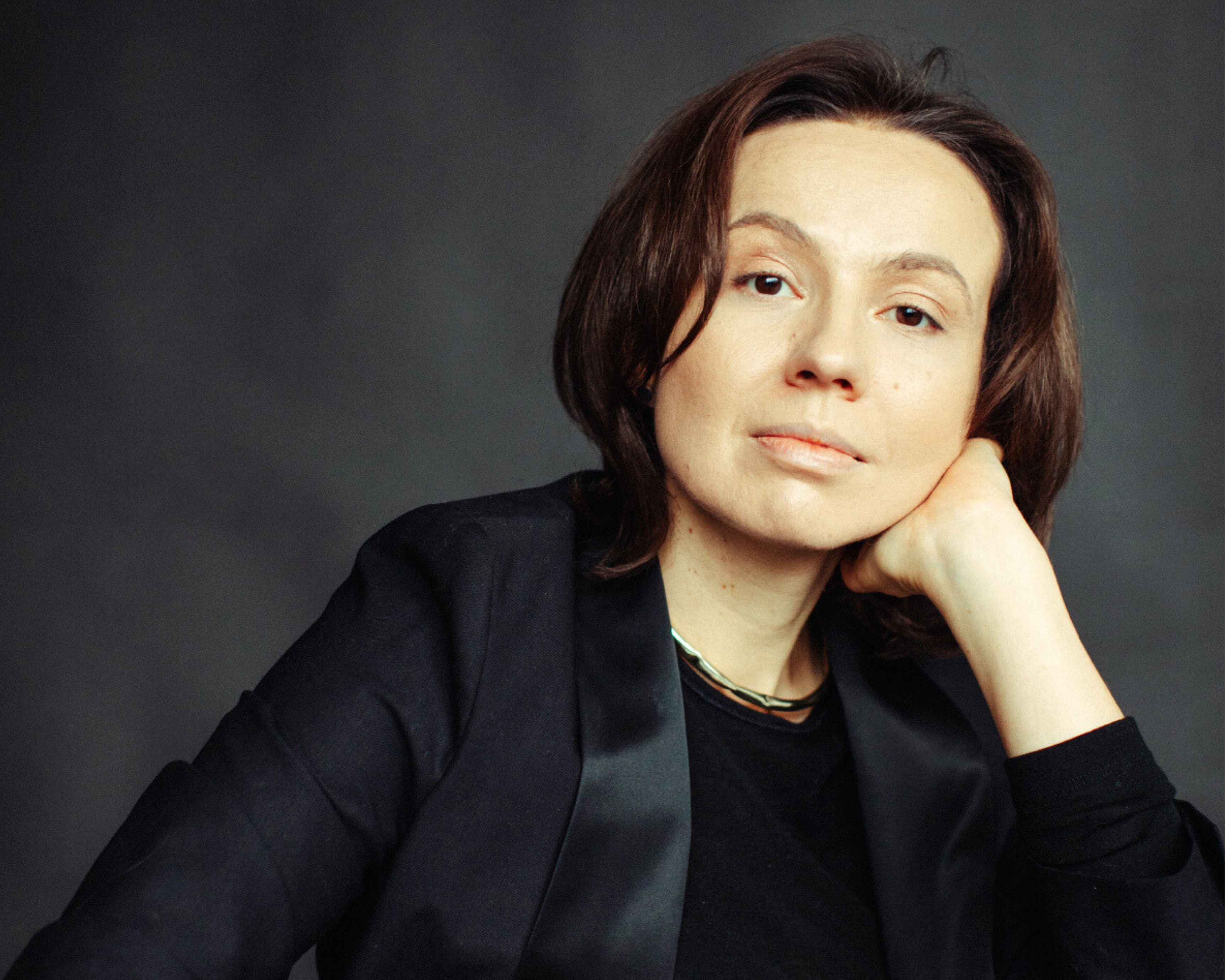“Everything is translation, so I’m translating my experiences into the books.”

Marta Gosovska is a Ukrainian writer, translator, editor and teacher. As part of our campaign “Name the translator!”, she talked to us about her work as a translator, the state of the literary world in Ukraine and the ways in which Ukrainian publishers make translators visible.
Interview: Ulrike Rehberg
Hello, Marta! You live in Ukraine, and you translate from English, French and Polish. How did you find yourself on the path to becoming a translator?
I started translating when I was five or six. I would translate poems from Polish for my friends who didn’t speak the language because I wanted to share the funny poems that my grandma had showed me. I even translated the rhymes! I drew pictures and made tiny copies of the translations, which I then distributed among my friends. You could say I have thirty-five years’ experience in translation.
My real translation journey began when I started translating the testimonies of war victims in Angola. That was when I decided I wanted to make a career out of translating and devote my time, skills and inner resources to it. It’s hard to tell which was my first book, because I have translated so many short stories and papers, but the real starting point is a translation to which I dedicated nine months of my life. I call this my intellectual pregnancy! It was painful, but worth it. The book, called Watching the English, is about the written rules of behaviour and the concept of Englishness, exploring what makes English people English. It was not the easiest text to translate into Ukrainian culture because our society is not strictly divided into social classes connected to language, behaviour, hobbies, food choices, clothing choices, interior design and even the way people start small-talk. For Ukrainians, it was really amusing to discover how the concept of Englishness works.
The project you brought to Looren, When Hitler Stole Pink Rabbit, carries a lot of symbolism for the time we live in today.
The film adaptation of the book was the last film I watched before the war in Ukraine broke out, and I haven’t watched any films since then. I’ve thought about this film so much and I want to share it with Ukrainians because it tells the story of being a Jewish German refugee in Switzerland, of losing everything you loved and never knowing whether you will be able to come back and rebuild your life. The book is told from a 10-year old’s perspective, and this fragile age makes the book touching and real. It’s not too sweet, nor too heavy for the readers, so I believe this book is very timely for Ukrainians now. I try to choose books that are symbolic and connected to my experiences.
Another book I recently translated is The Lonely City by Olivia Laing. I was drawn to it not only because of Laing’s beautiful, thoughtful prose, but because the themes of loneliness, alienation and the human need for connection feel urgently relevant, especially in the context of what Ukrainians are experiencing during the war. In the book, loneliness isn’t just personal; it’s social, emotional, almost existential. And I found powerful echoes of that in the way war isolates people, not just physically, but emotionally and culturally. Displacement, loss, separation from loved ones, being cut off from familiar places and routines ... These are deeply lonely experiences, and they’ve become part of daily life for so many Ukrainians.
Everything is translation, so I’m translating my experiences into the books.
Can you tell me about the situation for translators in Ukraine currently?
I would say that more than half the books major publishers in Ukraine publish are translations. We have many translators – and we need more! We have a unique opportunity now, with the international book market focused on the Ukrainian language. Most translations into Ukrainian are from English or other European languages such as German, French, Italian and Spanish. Younger readers are keen on manga, so there is growing interest in translations from Japanese.
How do Ukrainian publishers make translators more visible?
Oh, that’s my favourite question! I’m proud to say that I worked for the publishing house that was the first in Ukraine to put the translator’s name on the cover five years ago. One of the first books to feature the translator’s name was my translation of The Maid by Nita Prose, a Canadian writer. I’m very proud of that.
Wow!
The publishing house I consult for, Krapky, founded by a veteran, also names the translator on the cover. In fact, the entire new generation of Ukrainian publishing houses consistently emphasises the role of translators and highlights the importance of their work. Even many of the more established publishers are increasingly adopting this practice.
Do you think there is still room for improvement?
Oh, indeed. Especially now that publishers are discussing the possibility of using AI to translate, edit or correct books, it’s important to emphasise that a real human being stands behind the text you read in your mother tongue. It’s the product of intellectual work and the creation of a new piece of art, a creative act. It’s not just about translating words or sentences; it’s about conveying meaning. Translating from one culture to another is something I believe AI can’t do.
Human translators have a voice, whereas AI doesn’t. For example, there are two Ukrainian translations of À la recherche du temps perdu by Marcel Proust. One was translated by a deceased translator, and the other one by a contemporary translator. When I open the first page, I can immediately tell which is which, without seeing the translator’s name. Our unique voice shines through in our work because we put a lot of ourselves and our experiences into it. Roland Barthes may have said that the author is dead, but the translator is alive!
How could the situation in Ukraine serve as an example for translation scenes in other countries?
I think every country has something to share and we can learn a lot from each other’s experiences. Ukraine was brave in deciding to put the translator’s name on the cover. I sometimes hear strange reasons why it’s not possible, such as there being no space or it not looking nice, but I think that’s an unjustified excuse. Also, translators in Ukraine are setting trends and pitching books to publishing houses. For example, the story of Harry Potter in Ukraine is inseparable from the story of its translator, Viktor Morozov: He’s not just a translator, he’s a cultural icon. Before he ever picked up the first Harry Potter book, he was already a famous singer, songwriter and performer in Ukraine. His music and public presence had a huge fanbase, and when it was announced that he would be translating the series, it immediately created a buzz. What makes his translation so special isn’t just the language itself, but the life and personality he brought into it. He managed to preserve the magic of this magic world while making it feel deeply Ukrainian. His voice, both literally and literarily, became part of how an entire generation experienced that story.
In the context of our campaign “Name the translator!” we often talk about the best ways to make translators visible. This could be by including their name on the cover, or by commissioning forewords or afterwords by the translator. Is this common practice in Ukraine?
I recently read Catching Fire: A Translation Diary by Daniel Hahn, a diary which he kept while working on a book. From the first to the second draft, he commented on everything day after day, so you can follow his work. I was wondering whether Ukrainian readers would be interested in reading it. Then I recalled that while translating Watching the English, I shared my progress on social media. I shared difficult, funny and enjoyable topics and excerpts from my translation on Facebook, where I have 15,000 followers. My audience commented, offering me synonyms for words I had trouble with, helping me redirect my focus or simply sharing my joy or desperation. When I was lost in translation, they helped me fight my way back. I think this personal approach to translation would be really appreciated by readers. For my current book, I am keeping a translator’s diary on Telegram.
Maybe one day you can publish it as an afterword.
That would be lovely.
Thank you so much for the interview, Marta!

–––
Interview: Ulrike Rehberg
Title image: © Mykyta Pechenyk
Portrait photo: © Olia Dmytriv

